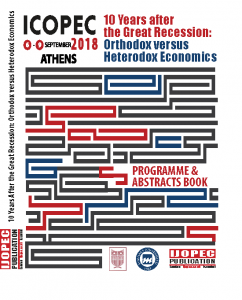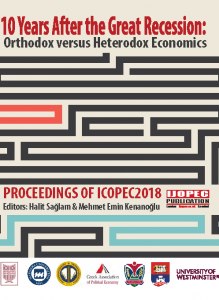ICOPEC 2018
CALL FOR PAPERS
“10 years after the Great Recession: Orthodox versus Heterodox Economics”
6-8 September 2018, Athens / Greece
The Main Theme and Scope of the Conference
The post-2007-8 global crisis (broadly branded as the Great Recession) is the fourth major global crisis of the capitalist system (after that of the 1870s, 1929 and 1974). The 2007-8 financial crisis and its consequences continue to rock the world economy, and fears of a new crisis continue to linger on.
The Great Recession came as a result of several decades of neoliberal restructuring that enhanced capital’s profits at the expense of labour, increased inequalities, and augmented poverty. During the period, the United States, in particular, led the neoclassical economics-driven liberalization, deregulation, and marketization, rolling back banking regulations and slighting the slippery fall in mortgage-lending standards. Under the Fed’s loose monetary policies during Alan Greenspan’s tenure, the ICT revolution and the increasing financialization of capitalism seemed to have engendered the so-called New Economy. As what goes up comes down, however, the seemingly business cycle-defying New Economy or “millennium boom” came to an abrupt end, and the subsequent crisis ushered in some retightening of the financial regulatory regime. However, there are now umpteen signs of those rules and regulations getting weakened yet again. Usually, in such circumstances when there is a great crisis that discredits the prevailing economic theory, there occurs a change of scientific paradigm. Such has happened, to a great extent, in previous major global crises. Notwithstanding, this time this has not been the case. Thanks in part to the effective government interventions such as prompt bailing out of the troubled financial institutions, key central banks’ massive quantitative easing, and G20 countries’ international collaboration in managing the crisis and stemming it from getting out of hand, perhaps the lesson has not been learned. After the initial shock and the implementation of hasty policy measures that contained the crisis, economic Orthodoxy has remained at the helm. Even in the academia, it seems even more dogmatic and less tolerant to any dissenting and Heterodox voices.
The focus of the main theme of ICOPEC 2018 is exactly on this riddle. How a very imperfect, limited, and problematic theory continues to dominate both the policy and the academic circles. What are the processes in the economy and the society that sustain its predominance? Is the resolution of the Great Recession final, or would it entail more upheavals in the near future? What is the condition of the economic Orthodoxy (particularly under its current form of the New Macroeconomic Consensus, which is the hybrid of mild neoliberalism with conservative New Keynesianism)? What is the condition of contemporary economic Heterodoxy? Is it a unified current, or does it encompass diverse and possibly contradictory perspectives? What is the current state of affairs in Political Economy? Last, but not least, how do all these affect the lives and the well-being of the great labouring majority of our societies?


